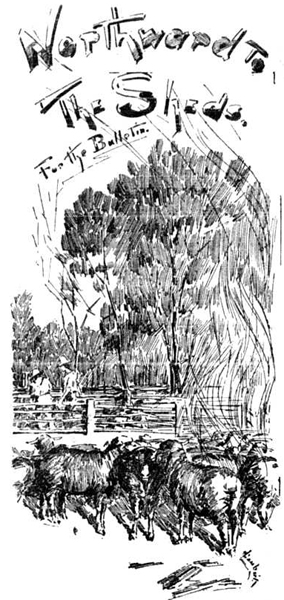A strong and stalwart man was he,
And he sat in the shearing shed
And shore, on the distant Boolooree,
Where the best of sheep are bred.
He sang in a voice that was full and deep,
And his shear blades merrily rang,
And he snipped and snipped at his bleating sheep;
And this is the song he sang --
Oh, it's goin' back to-morra, boys,
Back to 'ome, sweet 'ome --
The 'ome we left in sorra, boys,
The dismal north to roam.
We'll keep our 'ard-earned pay, me boys,
An' shun the bloomin' booze;
We'll stow our cheques away, me boys,
Fur drinkin' ain't no use.
When next I saw this shearer man
He was in a crowded bar,
Where the liquor fast and freely ran;
He was smoking a cigar.
His voice was loud, and his eye was bright,
And his language coarse and slang;
His face was cut - for he'd had a fight --
And this was the song he sang --
Come and 'ave a drink, me boys!
No, you can't refuse;
Don't care what you think, me boys,
I'm on the blanky booze.
Lashin' up me pay, me boys,
Little do I reck;
Drink dull care away, me boys;
I'm knockin' down me cheque.
Next morn I saw this shearer strong;
He was seated on his swag;
His merry, jovial air was gone,
And vanished was his brag.
His voice was thick and his eye was red;
A broken man was he;
And pleading and soft were the words he said,
And thus he spake to me --
Say, mister, buy us a pint, sir;
I've busted all I 'ad;
I'm aching in ev'ry jint, sir --
Me 'ead is awful bad.
I've lashed me earnin's up, sir --
Spent me bloomin' cheque,
So buy us a pick-me-up, sir -
I'm a gawd forsaken wreck!
First published in The Critic, 5 March 1898
Author reference sites: C.J. Dennis, Austlit, Australian Dictionary of Biography, Australian Poetry Library
See also.

